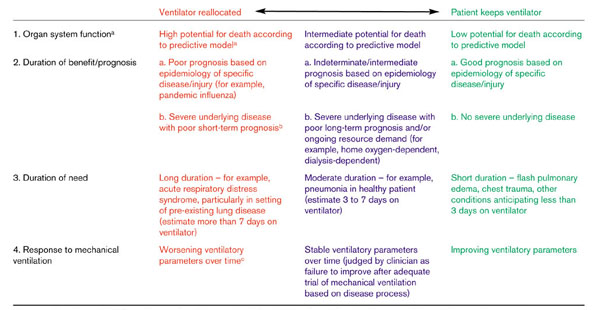Figure 1.

Compared to other patient(s) requiring and awaiting mechanical ventilation, does this patient have significant differences in prognosis or resource use in one or more categories above that would justify reallocation of the ventilator?
aThe SOFA (Sequential Organ Failure Assessment) score is a currently preferred scoring system based on type of data required and ease of calculation.
bExamples of underlying diseases that predict poor short-term survival include (but are not limited to) the following: congestive heart failure with an ejection fraction of less than 25% (or persistent ischemia unresponsive to therapy or ischemia with pulmonary edema); acute renal failure requiring hemodialysis (related to illness); severe chronic lung disease, including pulmonary fibrosis, cystic fibrosis, or obstructive or restrictive diseases requiring continuous home oxygen use prior to onset of acute illness; immunodeficiency syndromes with evidence of opportunistic pathogen infection; central nervous system, solid organ, or hematopoietic malignancy with poor prognosis for recovery; cirrhosis with ascites, history of variceal bleeding, fixed coagulopathy, or encephalopathy; acute hepatic failure with hyperammonemia; acute and chronic and irreversible neurologic impairment that makes patient dependent for all personal care (for example, severe stroke, congenital syndrome, persistent vegetative state, and severe dementia).
cChanges in oxygenation index (OI) over time may provide comparative data, though of uncertain prognostic significance. OI = MAWP × FiO2/PaO2, where MAWP is mean airway pressure, FiO2 is inspired oxygen concentration, and PaO2 is arterial oxygen pressure. PaO2 may be estimated from peripheral oxygen saturation by using the oxygen dissociation curve if blood gas measurements are unavailable.
